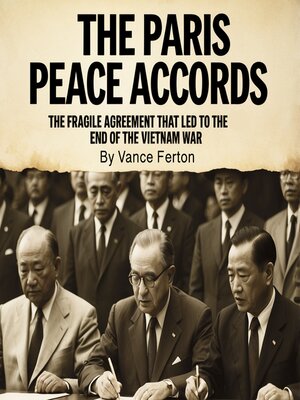The Paris Peace Accords
audiobook (Unabridged) ∣ The Fragile Agreement That Led to the End of the Vietnam War
By Vance Ferton

Sign up to save your library
With an OverDrive account, you can save your favorite libraries for at-a-glance information about availability. Find out more about OverDrive accounts.
Find this title in Libby, the library reading app by OverDrive.



Search for a digital library with this title
Title found at these libraries:
| Library Name | Distance |
|---|---|
| Loading... |
This audiobook is narrated by a digital voice.
The path to the Paris Peace Accords began not in the elegant conference rooms of the French capital, but in the jungles and rice paddies of Vietnam, where a conflict that had consumed American attention and resources for over a decade was slowly grinding toward an inevitable conclusion. By the late 1960s, it had become increasingly clear to political leaders on all sides that military victory in the traditional sense was unlikely, and that some form of negotiated settlement would be necessary to end the bloodshed that had claimed hundreds of thousands of lives and destabilized an entire region.
The origins of serious peace negotiations can be traced to March 1968, when President Lyndon Johnson announced a partial bombing halt over North Vietnam and declared that he would not seek reelection. This dramatic shift in American policy reflected growing domestic opposition to the war, particularly after the Tet Offensive had demonstrated the resilience of communist forces despite years of intensive American military involvement. Johnson's decision opened the door for preliminary peace talks, which began in Paris in May 1968 with representatives from the United States, North Vietnam, South Vietnam, and the National Liberation Front.
These initial negotiations quickly became mired in procedural disputes that reflected the deeper political and military complexities of the conflict. The question of who could legitimately represent the South Vietnamese people proved particularly contentious, with North Vietnamese negotiators insisting that the National Liberation Front was the sole authentic voice of the southern population, while American and South Vietnamese representatives rejected this claim. Even seemingly minor issues such as the shape of the negotiating table became subjects of prolonged debate, as each side sought to establish symbolic precedents that might influence the substance of eventual agreements.







